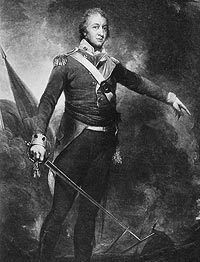Description
 Speculate why the bellicose General, the Earl of Mulgrave, in 1806 commissioned an elaborate painting of the death of Siccius Dentatus. He approached the young up-and-coming Cornish grammar-school educated painter Benjamin Robert Haydon, who planned to borrow motifs from the Elgin Marbles.
Speculate why the bellicose General, the Earl of Mulgrave, in 1806 commissioned an elaborate painting of the death of Siccius Dentatus. He approached the young up-and-coming Cornish grammar-school educated painter Benjamin Robert Haydon, who planned to borrow motifs from the Elgin Marbles.
Lord Mulgrave’s name was actually Henry Phipps. He was a rich Anglo-Irish aristocrat and enthusiastic solider. Only five years after he joined the 1st Regiment of Foot Guards in 1775 he had risen to be Lieutenant Colonel. By 1801 he was Lieutenant General. He served against the American rebels in 1776-8, in the West Indies in 1780, against Napoleon in France in 1793, and in New Zealand.
Such a warlike defender of British rule in the colonies will have identified with Siccius Dentatus (514-450 BC), known as the bravest man in Republican Rome. Mulgrave knew that this ‘Roman Achilles,’ had seen off the Sabines, fought in 120 battles, killed eight champions in single combat, received forty wounds (all to his front in direct fighting), nine triumphal processions and innumerable honours.
As a much-decorated war hero, Mulgrave must have thrilled to the ancient accounts of Dentatus’ death: he was assassinated on the orders of envious rivals, and his killers only succeeded by treacherously crushing him with a rock launched from overhead when he was busily fighting.
But ancient history often resists its interpreters’ agendas. Mulgrave either did not understand the political background to Dentatus’ death, or ignored it: he was a conservative and absolutely opposed to political reform or giving the lower classes more power. Dentatus, on the other hand, had been a tribune and fervent supporter of the plebeians in their struggle with the patricians. His assassination was planned by the aristocrat Decemvirs because he fraternized with the lower orders and was becoming too popular for comfort. Anger at his death helped to trigger the plebeian secession of 449 BC and the Law of the Twelve Tables. Not the sought of development which Lord Mulgrave would have wanted to encourage.






